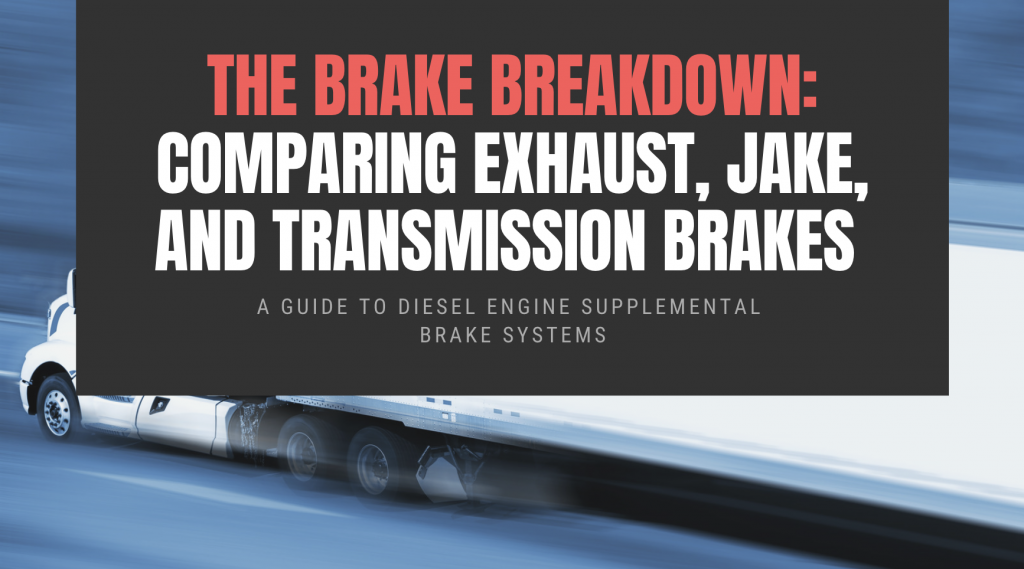When you have a big vehicle it requires big brakes. While most big semis and other heavy equipment have supplemental braking systems to accommodate this, which one is the best? I have driven with all of the above braking systems so I have made the effort to give you an overview. I hope you find it helpful.
What is the difference between an exhaust brake and a jake brake?
The main difference between an exhaust brake and a Jake brake is how they work, exhaust brakes work by diverting exhaust gases back into the engine, while the Jake brakes work by opening the engine’s valves at the top of the compression stroke.

An exhaust brake and a Jake brake are both engine brakes used to slow down a vehicle, but they work in different ways.
An exhaust brake is a device that uses the engine’s exhaust system to slow down the vehicle. It works by diverting exhaust gases back into the engine, which creates backpressure in the engine, slowing it down. Exhaust brakes are typically found on diesel engines and are useful for controlling speed while driving downhill or when braking on wet or slippery roads.
A Jake brake, also known as a compression release brake, is a type of engine brake that uses the engine’s compression to slow down the vehicle. It works by opening the engine’s valves at the top of the compression stroke, allowing air to escape, which slows down the engine. Jake brakes are typically found on larger diesel engines, such as those in semi-trucks and buses, and are useful for controlling speed while driving downhill or when braking on wet or slippery roads.
What about transmission retarders?
Transmission Brake: A transmission brake is a type of brake that uses the transmission to slow down the vehicle. It works by decreasing the gear ratio between the engine and the wheels, which causes the wheels to turn more slowly. Transmission brakes are typically found on vehicles with manual transmissions and can be used to slow down the vehicle while driving downhill or during normal braking.
There are some dangers with the use of transmission brakes. One is that they can cause damage to the engine if used improperly or excessively. This can result in costly repairs and can cause the engine to fail.
Also, if the transmission brake is not properly maintained it can fail, which can lead to a loss of braking power and increased stopping distance, which can be dangerous in a heavy vehicle. If the transmission brake is not functioning properly, it may not activate when the driver needs it to, which can lead to a dangerous situation.
Overall, while transmission brakes can be a useful tool for slowing down heavy vehicles, they must be used correctly and maintained properly to avoid potential dangers.
This is not an exhaustive list of supplemental braking, just the most popular. When I was working on fire trucks we had a brake that actually used the drive shaft to slow down. the shaft had a rotor and there was a pad for braking attached to it.
What is the best supplemental braking system for heavy equipment?
Exhaust brakes have several advantages over Jake brakes and transmission brakes.
Here are 7 reasons Exhaust brakes are the best supplemental braking system:
- More Efficient: Exhaust brakes are more efficient than Jake brakes and transmission brakes because they use the energy from the exhaust gases to slow down the vehicle, rather than wasting energy through heat generated in the braking system.
- Longer Life: Exhaust brakes have a longer life than Jake brakes and transmission brakes because they have fewer moving parts and are less likely to wear out.
- Better Control: Exhaust brakes provide better control over the vehicle’s speed compared to Jake brakes and transmission brakes, making them more suitable for use in hilly or mountainous terrain, or when driving on wet or slippery roads.
- Cooler Operation: Exhaust brakes operate at a cooler temperature than Jake brakes, which helps to prolong the life of the engine and other components.
- Reduced Noise: Exhaust brakes produce less noise than Jake brakes, which makes them more suitable for use in residential or other noise-sensitive areas.
- Easier to Install: Exhaust brakes are easier to install than Jake brakes and transmission brakes because they do not require any modification to the engine or transmission.
- Cost Effective: Exhaust brakes are more cost-effective than Jake brakes and transmission brakes because they are less expensive to purchase and require less maintenance.
It is worth noting that the choice of which brake system to use will depend on the specific needs of the vehicle and the type of driving conditions. Jake brakes and transmission brakes have their own advantages and can be better suited for some types of vehicles and in some specific driving conditions.
Summing up
No matter why you are stopping you need to make sure you can. Whatever your vehicle comes equipped with is probably sufficient but when you need more now you have more knowledge to make a great choice for your supplemental braking system.
